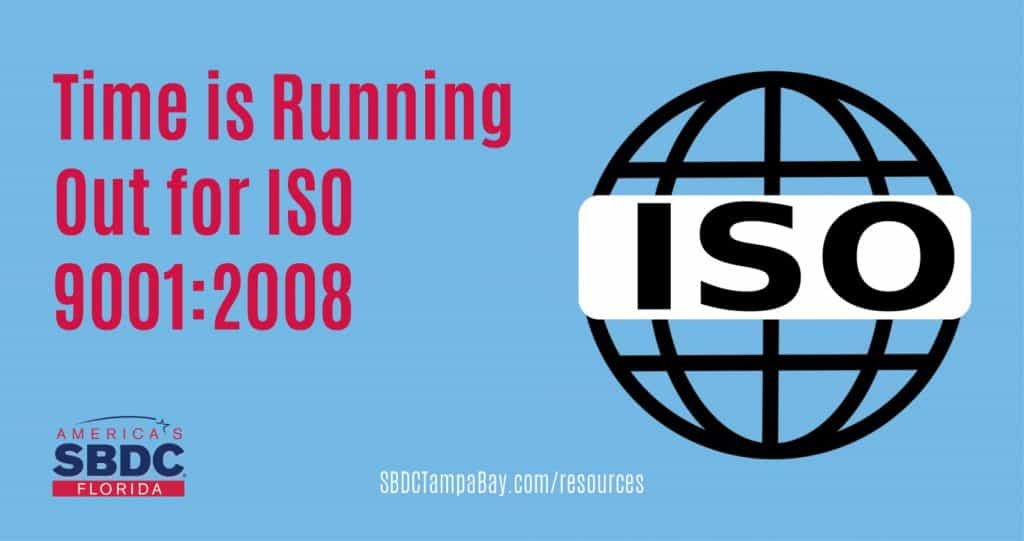Time is Running Out for ISO 9001:2008
By Mitch Lairmore | September 21, 2017
Are you planning on being ISO 9001 certified next year?
There are numerous benefits of implementing a quality management system (QMS) in your small business. Reducing defects can impact costs and improve customer satisfaction. The implementation of a QMS can represent a significant investment but can provide payoffs in the form of improved employee morale and enhance shareholder value because of higher profitability. Small businesses can implement a QMS by themselves or contract with service providers who have expertise in this area for assistance.
The ISO 9001 standard outlines the requirements for a QMS. It is part of the ISO 9000 family of quality management system standards. ISO 9001 is a widely-adopted standard. According to ISO, more than 1 million ISO 9001 certificates were issued in 2015. ISO 9001 is not just for manufacturing companies. The standards can be applied to improve the processes in any organization including service companies.
What is ISO?
A little background on ISO from their website. The International Organization for Standardization, ISO is an international non-governmental organization that serves as a global network of 163 country standards bodies. ISO develops and publishes international standards. ISO periodically reviews and updates standards. ISO does not provide certification or conformity assessment services, although ISO publishes standards related to the certification process.
Small businesses can implement a QMS system and reap benefits without an ISO 9001 certification. However, obtaining ISO 9001 certification can provide significant benefits. Large multinational companies often require that their vendors have ISO 9001 certification. The certification can also help you gain a competitive edge by convincing government customers that your company is a reliable supplier. ISO 9001 certification can be important if you have plans for expanding out of your home country because it is a well-known international standard. An ISO 9001 certification may be required in order to start a dialogue with a potential customer in another country.
ISO allows businesses to promote the fact that their company is ISO 9001 certified. Not surprisingly, ISO publishes a document which specifies the allowable methods for communicating your certification. Unfortunately, these rules can impact small businesses in near future. ISO updated the ISO 9001 standard in 2015. Companies cannot just state they have ISO 9001 certification, more specificity is required. Companies must indicate they have ISO 9001:2008 certification or they have ISO 9001:2015 certification.
Companies that have ISO 9001:2008 certification will not be valid after Sept. 14, 2018. After that time, companies must have ISO 9001:2015 certification in order to promote their ISO 9001 certification status. According to SpecAudit, a Florida-based company that provides ISO implementation services, there are about 2 million companies with ISO 9001 certification but only about 3,000 accredited assessors who can perform the audits necessary for ISO 9001:2015. That means companies that procrastinate their transition from ISO 9001:2008 to ISO 9001:2015 may not be able to do so before the September 14 deadline because of the limited number of auditors. Therefore, if it is important to your business to not have a lapse in your ISO 9001 certification, it would be beneficial to start the ISO 9001:2015 certification process soon.
There are a couple of ways you can proceed with your certification process. Companies can buy “kits” from vendors that contain the paperwork for doing the certification yourself. The kits cost about $1,000. There are a number of factors which would determine how long it would take a given company to complete the process. The other alternative is to contract a consultant to guide your company through the process. A Google search for ISO 9001 certification will surface a number of firms. We recommend that you get quotes from multiple providers. It is also a good idea to obtain references from potential suppliers and call the references.





